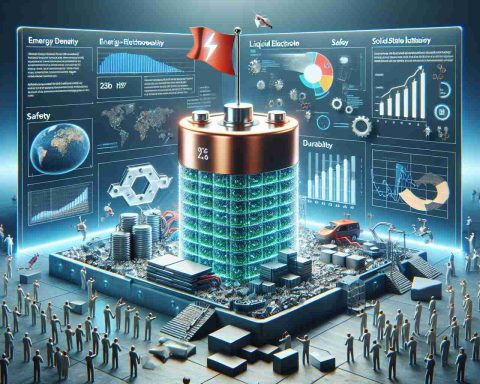A Significant Breakthrough in Battery Technology
At the CES event in Las Vegas, Yadea, a frontrunner in the electric two-wheeler market from China, unveiled its cutting-edge sodium-ion battery. This innovative battery boasts improvements in environmental sustainability, safety, and longevity when contrasted with conventional lithium batteries.
Yadea’s sodium-ion batteries showcase exceptional charging capabilities, allowing users to recharge to 80% in a mere 15 minutes, thanks to the advanced HuaYu Sodium Superfast Charging Ecosystem. This rapid charging is complemented by thorough safety evaluations; Yadea emphasizes that it has conducted over 20 stringent safety tests to ensure the batteries remain fire- and explosion-resistant, even under extreme conditions.
With an energy density of 145 Wh/kg and a cycle life reaching 1,500 cycles at room temperature, these batteries are designed for durability, promising up to five years of reliable performance and supported by a three-year warranty. Furthermore, they maintain impressive discharge rates, with over 92% retention at temperatures as low as -20°C, offering an expected range of approximately 70 kilometers.
In addition to these advancements, Yadea has introduced a subsidiary focused on sodium-ion battery development, titled ‘Huayu JiNa Supercharging Ecosystem.’ This new initiative aims to feature supercharging stations that can identify and secure damaged batteries, marking a significant evolution in battery management technologies.
Revolutionizing Energy: Yadea’s Sodium-Ion Battery Breakthrough
A Significant Breakthrough in Battery Technology
At the CES event in Las Vegas, Yadea, a leading name in China’s electric two-wheeler market, unveiled its groundbreaking sodium-ion battery technology. This innovation not only aims to surpass traditional lithium batteries in terms of environmental sustainability, safety, and longevity, but also introduces remarkable advancements that could redefine the future of energy storage and electric mobility.
Features and Specifications
Yadea’s sodium-ion batteries are designed with several key specifications that set them apart from their lithium counterparts:
– Rapid Charging: Users can recharge the battery to 80% capacity in just 15 minutes utilizing the advanced HuaYu Sodium Superfast Charging Ecosystem.
– Energy Density: The batteries boast an energy density of 145 Wh/kg, which is competitive for modern usage.
– Cycle Life: With a cycle life of up to 1,500 cycles at room temperature, these batteries promise longevity, making them suitable for various applications.
– Temperature Resilience: They retain over 92% discharge efficiency at temperatures as low as -20°C, essential for wide-range use.
– Expected Range: The expected operational range per charge is approximately 70 kilometers, catering to urban commuting needs.
Safety and Testing
Safety is a paramount focus for Yadea. The company has conducted more than 20 stringent safety tests, validating the battery’s resistance to fire and explosions, even under extreme conditions. This proactive approach aims to alleviate consumer concerns over battery safety in electric vehicles.
Innovations: Huayu JiNa Supercharging Ecosystem
In conjunction with the battery launch, Yadea introduced a dedicated subsidiary, the Huayu JiNa Supercharging Ecosystem. This initiative is poised to revolutionize battery management technologies by deploying supercharging stations that are capable of identifying and securing damaged batteries. This innovation not only enhances the safety of battery usage but also contributes to a more sustainable energy ecosystem by facilitating battery life extension and recycling processes.
Pros and Cons
Pros:
– Rapid charging capability reduces downtime.
– Long cycle life ensures durability and cost-effectiveness.
– Enhanced safety features provide peace of mind to users.
– Environmental benefits due to reduced dependency on lithium.
Cons:
– As a new technology, it may face initial skepticism from consumers.
– Infrastructure for supercharging stations is still in developmental phases.
Market Insights and Trends
As consumers increasingly seek sustainable alternatives to lithium-ion batteries, Yadea’s sodium-ion batteries align with global trends towards eco-friendly technology. This shift is likely to influence battery manufacturers and electric vehicle producers to explore sodium-ion chemistry as a viable option.
Pricing and Availability
While specific pricing details for Yadea’s sodium-ion batteries have yet to be announced, the general trend in emerging technologies suggests that initial costs may be higher, but competitive pricing could follow as production scales. Consumers can expect these batteries to be available within the coming months, making strides in the electric two-wheeler segment.
Conclusion
Yadea’s sodium-ion battery technology marks a significant advancement in the pursuit of sustainable and efficient energy solutions. With safety, rapid recharging, and a commitment to environmental responsibility, these batteries could reshape the future of electric mobility. For more information about Yadea and their innovations, visit Yadea.


















